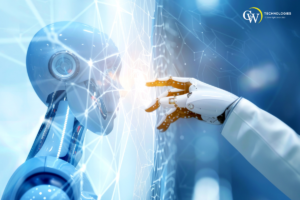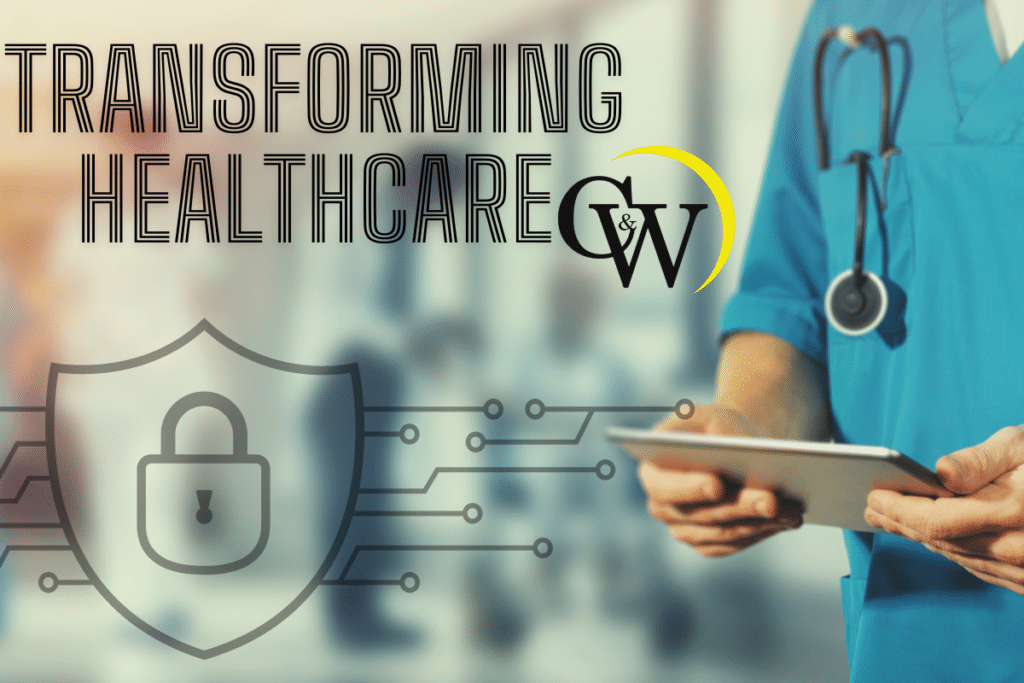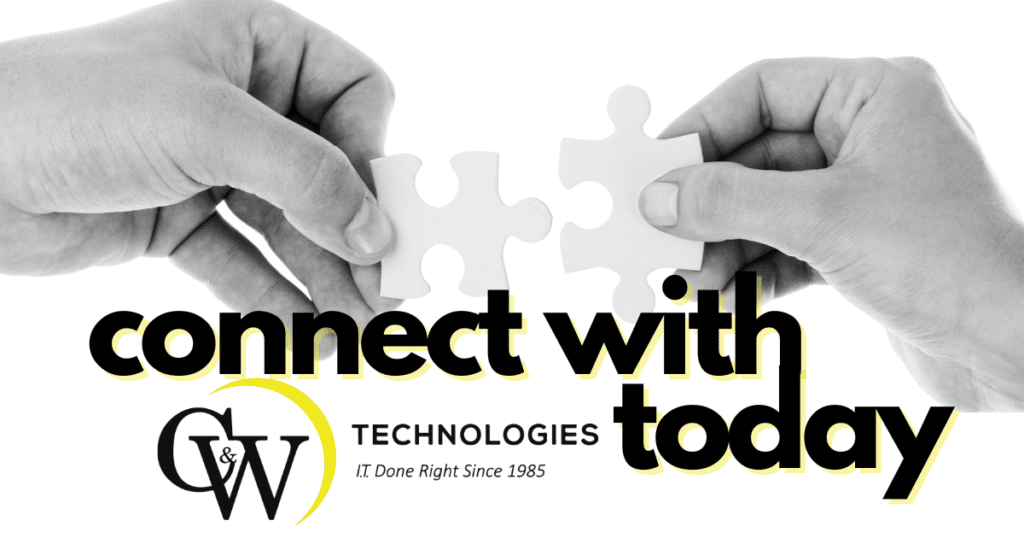Transforming Healthcare: The Emergence of AI-Driven Blood Tests
According to information from SciTechDaily, AI-driven blood tests are making a lifesaving leap in early cancer detection. The potential of these tests lies in their ability to analyze vast amounts of data with unprecedented precision, enabling early diagnosis and timely intervention.
Researchers at Weill Cornell Medicine, NewYork-Presbyterian, the New York Genome Center (NYGC), and Memorial Sloan Kettering Cancer Center (MSK) have developed a novel AI-powered technique for identifying tumor DNA in blood. This method has demonstrated remarkable sensitivity in forecasting cancer recurrence. The advanced technology holds great promise for enhancing cancer treatment through the extremely early detection of cancer returning and thorough monitoring of tumor reactions during therapy.
What is AI-Powered Blood Testing?
AI-powered blood testing combines the power of advanced algorithms and machine learning with traditional laboratory techniques to analyze blood samples for various diseases. This technology can process large amounts of data in a fraction of the time it takes for traditional methods, resulting in faster and more accurate diagnoses.
Traditionally, doctors rely on specific biomarkers or proteins in the blood to diagnose diseases. However, these biomarkers may not be present or easily detectable in certain diseases, leading to misdiagnosis or delayed diagnosis. AI-powered blood tests, on the other hand, analyze multiple biomarkers and look for patterns in the data to identify diseases early on.
Advantages of AI-Powered Blood Tests
One of the major advantages of an AI blood test is their ability to detect diseases at an earlier stage. This not only improves patient outcomes but also reduces healthcare costs by preventing more serious and costly treatments later on. These tests can be performed quickly and accurately, allowing for timely interventions and personalized treatment plans.
Another benefit of this technology is its potential to improve diagnostic accuracy. By analyzing a vast amount of data, AI algorithms can identify subtle changes in biomarkers that may be missed by human interpretation. This could lead to more accurate and timely diagnoses, potentially saving lives.
Applications of AI-Powered Blood Testing
The applications of this technology are vast and cover a wide range of diseases. Some examples include the early detection and monitoring of cancer, infectious diseases such as HIV and hepatitis, autoimmune disorders like rheumatoid arthritis, and cardiovascular diseases.
AI-powered blood tests can also be used for risk assessment and disease prevention. For instance, they can analyze a person’s genetic data along with lifestyle factors to determine their risk of developing certain conditions such as diabetes or heart disease. This information can then be used to develop personalized prevention plans.
What is AI-Powered Blood Testing?
AI-powered blood testing combines the power of advanced algorithms and machine learning with traditional laboratory techniques to analyze blood samples for various diseases. This technology can process large amounts of data in a fraction of the time it takes for traditional methods, resulting in faster and more accurate diagnoses.
Traditionally, doctors rely on specific biomarkers or proteins in the blood to diagnose diseases. However, these biomarkers may not be present or easily detectable in certain diseases, leading to misdiagnosis or delayed diagnosis. AI-powered blood tests, on the other hand, analyze multiple biomarkers and look for patterns in the data to identify diseases early on.
Advantages of AI-Powered Blood Tests
One of the major advantages of an AI blood test is their ability to detect diseases at an earlier stage. This not only improves patient outcomes but also reduces healthcare costs by preventing more serious and costly treatments later on. These tests can be performed quickly and accurately, allowing for timely interventions and personalized treatment plans.
Another benefit of this technology is its potential to improve diagnostic accuracy. By analyzing a vast amount of data, AI algorithms can identify subtle changes in biomarkers that may be missed by human interpretation. This could lead to more accurate and timely diagnoses, potentially saving lives.
Applications of AI-Powered Blood Testing
The applications of this technology are vast and cover a wide range of diseases. Some examples include the early detection and monitoring of cancer, infectious diseases such as HIV and hepatitis, autoimmune disorders like rheumatoid arthritis, and cardiovascular diseases.
AI-powered blood tests can also be used for risk assessment and disease prevention. For instance, they can analyze a person’s genetic data along with lifestyle factors to determine their risk of developing certain conditions such as diabetes or heart disease. This information can then be used to develop personalized prevention plans.
Challenges and Future Implications
While the potential benefits of AI-powered blood tests are numerous, there are also some challenges that need to be addressed. One of the main concerns is ensuring the accuracy and reliability of these tests. As with any technology, there is always room for error, and it’s important to continually validate and improve the algorithms used in these tests.
Another challenge is ensuring accessibility and affordability for all patients, regardless of their socioeconomic status. The cost of developing and implementing AI-powered blood tests may be a barrier for some healthcare systems and patients, and efforts need to be made to address this issue.
Despite these challenges, the future implications of AI-powered blood tests are promising. With continued research and development, this technology has the potential to improve disease diagnosis and management, ultimately leading to better patient outcomes and a more efficient healthcare system.
What is an AI Blood Test for Cancer?
An AI blood test for cancer is a type of diagnostic test that uses artificial intelligence technology to analyze blood samples and detect the presence of cancer cells. It works by looking for specific biomarkers in the blood that are associated with different types of cancer.
One example of an AI blood test for cancer is Cologuard, which was FDA-approved in 2014. This test screens for colorectal cancer by detecting DNA mutations and abnormal levels of certain proteins in the blood.
Other AI blood tests for cancer are currently being developed, including ones for breast, lung, and prostate cancers. These tests have the potential to improve early detection and treatment of cancer, leading to better outcomes for patients.
How AI is Used for Diagnosis and Treatment
AI has already made a significant impact in healthcare beyond blood testing. It is being used for disease diagnosis, treatment planning, drug development, and more. In the field of radiology, AI algorithms can analyze medical images to assist doctors in detecting abnormalities and making accurate diagnoses.
Moreover, AI-powered decision support tools are helping clinicians make more informed treatment decisions by analyzing patient data and providing personalized treatment recommendations. This technology can also be used to predict potential side effects or complications from certain treatments based on a person’s genetic makeup and medical history.
Furthermore, AI is playing a crucial role in drug development by speeding up the process and identifying potential drug candidates that would have otherwise been missed. This could lead to more effective and targeted treatments, reducing the trial-and-error approach in medicine.
The Intersection of Human Intelligence and AI
The revolution of AI is intricately tied to the process of mimicking human intelligence. By processing vast amounts of data, AI systems can perform tasks that typically require human-level intelligence. These intelligent systems are trained using large datasets, allowing them to identify patterns and make predictions. For instance, an AI might analyze training data to detect early signs of liver cancer, enabling timely interventions that could significantly improve patient outcomes.
Human life stands to benefit immensely from these advancements, especially when we consider the capabilities of AI systems to augment medical diagnoses and treatments. The human brain, with its unmatched complexity, serves as a model for artificial neural networks, which underpin much of modern AI technology. These networks are particularly powerful in fields like natural language processing, where they can comprehend and generate human language with remarkable accuracy.
In the fourth industrial revolution, the integration of AI into healthcare marks a significant leap forward. AI-powered tools are being developed to diagnose liver disease with greater precision than ever before, leveraging the technology’s ability to analyze intricate data that might elude human practitioners. As these artificial intelligence systems evolve, they promise to make healthcare more effective and accessible, transforming patient care on a global scale.

IT Cost Savings – How You Can Save Your Business Money

IT Partner Solutions for Stress-Free Technology Management

5 Breakthroughs in Technology and Climate Change

AI Security: Best Practices and Key Strategies

The Impact of AI: Transforming Industries and Everyday Life

Celebrating 40 Fantastic Years at C&W Technologies
The AI World-Changing Revolution in Healthcare
With AI-powered blood tests and other applications of this technology, we are witnessing a revolution in healthcare. Not only is it improving disease diagnosis and treatment, but it is also transforming the way we approach healthcare as a whole. From precision medicine to personalized treatment plans, AI has the potential to greatly improve patient outcomes and make healthcare more efficient.
As this technology continues to evolve and become more accessible, we can expect even more breakthroughs in the field of healthcare. So while we have already reached a major milestone with the first FDA-approved AI-powered blood test, there is still much more to come in this exciting new era of healthcare.
So, we can expect to see AI continue to revolutionize the way we manage and treat diseases, ultimately leading to a healthier and more advanced society. Our future with AI in healthcare is indeed full of possibilities, and it’s an exciting time for both patients and medical professionals alike.
Risks of Using AI in Healthcare and How to Avoid Them
While the potential benefits of AI in healthcare are vast, it’s also important to acknowledge and address the potential risks that come with its use. One major concern is data privacy and security. As AI relies on large amounts of data to function, ensuring patient confidentiality and protecting against data breaches is crucial.
Another risk is biased algorithms, which can lead to unequal treatment or inaccurate diagnoses for certain demographics. To avoid this, it’s vital to have diverse and representative datasets and continuously monitor and correct for bias in AI algorithms.
It’s also essential to maintain a balance between human oversight and reliance on AI technology. While AI can greatly assist in diagnosis and treatment, it should not replace human medical professionals entirely. Human input and judgment are still crucial for making complex decisions and providing compassionate care to patients.
Seeking Help with Cybersecurity Setup in Healthcare
To mitigate these risks and ensure the safe and effective use of AI in healthcare, it’s important to seek help with cybersecurity setup. This can involve implementing secure data storage and communication systems, conducting regular risk assessments, and having protocols in place for handling breaches or errors.
Collaborating with experts in both healthcare and technology is also crucial. By working together, we can continue to improve and advance the use of AI in healthcare while addressing any concerns or challenges that may arise.
Partnering with C&W Technologies for Robust Healthcare Cybersecurity
In this rapidly evolving landscape of AI in healthcare, ensuring the security of patient data and the integrity of AI systems is paramount. Partnering with experts like C&W Technologies can provide the necessary cybersecurity infrastructure to safeguard sensitive information and support the seamless integration of AI into healthcare practices.
With C&W Technologies at your side, you can navigate the complexities of cybersecurity, mitigate potential risks, and confidently harness the transformative power of AI for improved patient care and outcomes. So why wait? Contact us today to learn more about our healthcare cybersecurity solutions and how we can help you stay ahead in the ever-changing world of AI in healthcare.
Together, we can embrace the future of healthcare with confidence and security. So, let’s join hands in this journey towards a healthier and more advanced society. The possibilities are endless, and with proper precautions and partnerships, we can make them a reality.
Embracing the Future of Healthcare
AI-powered blood tests have taken us one step further into the future of healthcare. With its potential to improve disease diagnosis and treatment, as well as revolutionize the healthcare system, AI is a game-changing technology that we cannot ignore. However, it’s important to approach its use with caution and ensure proper cybersecurity measures are in place.
By collaborating with experts and continuously monitoring and addressing any potential risks, we can fully embrace the power of AI in healthcare and create a future where better patient outcomes and a more efficient healthcare system are a reality. The possibilities are endless, so let’s continue to explore and push boundaries with AI in healthcare. So, let’s embark on this journey towards a healthier world together. Together, we can make it happen. Contact us today!
Frequently Asked Questions (FAQs)
What is the AI revolution in healthcare?
The AI revolution refers to the transformative changes brought about by artificial intelligence in various fields, including healthcare. AI systems are capable of processing vast amounts of data, thus enabling enhanced diagnostic precision, personalized treatment plans, and overall improved patient care.
How does an AI system analyze medical data?
An AI system utilizes complex algorithms and artificial neural networks to process and analyze large datasets. Through statistical analysis and pattern recognition, these systems can identify trends and make diagnostic predictions that may elude human practitioners.
Can AI help with the diagnosis of Hepatitis B Virus?
Yes, AI can significantly aid in the diagnosis of Hepatitis B Virus (HBV). By analyzing vast datasets and identifying patterns, AI systems can detect the virus more accurately and potentially earlier than traditional diagnostic methods.
What is Artificial General Intelligence (AGI) and how does it differ from AI?
Artificial General Intelligence (AGI) refers to a form of AI that exhibits human-like intelligence and versatility across a wide range of tasks. Unlike narrow AI, which can only perform specific tasks, AGI has the ability to understand, learn, and apply knowledge in multiple domains, closer to human form intelligence.
How are self-driving cars an example of AI?
Self-driving cars use AI, particularly deep learning and pattern recognition, to navigate roads, recognize traffic signals, and make real-time driving decisions. These AI-driven vehicles process and analyze sensor data to operate safely and efficiently on their own.
What role does AI play in managing repetitive tasks?
AI excels at automating repetitive tasks, freeing human workers to focus on more complex and creative activities. By handling tasks that involve data entry, scheduling, or monitoring, AI systems enhance productivity and reduce human error.
What is the significance of big data in AI?
Big data provides the raw material for AI systems to learn and make informed decisions. With access to hundreds of millions of data points, AI can perform more accurate analyses and deliver insightful predictions, driving advancements across various industries, including healthcare.
Are AI systems in healthcare based on science fiction concepts?
While some AI advancements may seem like science fiction, many are grounded in solid scientific research and development. The integration of AI in healthcare, while once imagined in works like “Star Wars,” is rapidly becoming a scientific reality, transforming our daily lives.
What is the key computational power behind AI’s capabilities?
AI relies on advanced computational power to process and analyze vast amounts of data. This includes high-performance processors, parallel computing, and specialized hardware that support the complex computations required by learning algorithms and deep learning models.
How does pattern recognition work in AI?
Pattern recognition in AI involves identifying and understanding recurring patterns within data. This capability is fundamental in tasks such as image and speech recognition, enabling AI systems to interpret and respond to data in a human-like manner.
How does personal experience influence AI algorithms?
AI algorithms can be trained on data that includes personal experiences, allowing them to learn from real-world inputs. This makes the AI more effective in areas like personalized medicine, where individual patient data can shape treatment plans.
What are the major challenges faced in AI implementation?
One major challenge in AI implementation is ensuring data privacy and security. Additionally, creating unbiased and representative datasets, managing the computational resources required, and integrating AI systems into existing workflows are significant hurdles that need to be addressed.
What are learning algorithms, and how do they impact AI development?
Learning algorithms enable AI systems to learn from data and improve their performance over time. They are the core of deep learning, allowing AI systems to adapt and refine their analyses, leading to more accurate and effective outcomes.
Can you provide an example of AI creating a new paradigm in healthcare?
The term AI has ushered in a new paradigm in healthcare with innovations like AI-powered blood tests, which can diagnose diseases with unprecedented accuracy. This represents a shift towards more proactive, data-driven patient care.
How are AI advancements related to “Star Wars” becoming part of our daily lives?
AI advancements, once depicted in science fiction like “Star Wars,” are increasingly becoming integral to our daily lives. From personal assistants to advanced medical diagnostics, AI systems are revolutionizing the way we live and work, making the imagined future a present-day reality.




